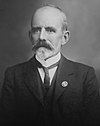Wellington Central by-election, 1918
|
|
|||||||||||||||||||||||||||||||||||
|---|---|---|---|---|---|---|---|---|---|---|---|---|---|---|---|---|---|---|---|---|---|---|---|---|---|---|---|---|---|---|---|---|---|---|---|
|
|||||||||||||||||||||||||||||||||||
|
The Wellington Central seat in the House of Representatives. Election by simple majority using first-past-the-post voting. |
|||||||||||||||||||||||||||||||||||
| Turnout | 84.4% | ||||||||||||||||||||||||||||||||||
|
|||||||||||||||||||||||||||||||||||
|
|||||||||||||||||||||||||||||||||||
The Wellington Central by-election of 1918 was a by-election held in the Wellington Central electorate during the 19th New Zealand Parliament, on 3 October 1918. It was caused by the death of incumbent MP Robert Fletcher of the Liberal Party and was won by Peter Fraser with a majority of 1,624.
The Wartime Coalition government between the Reform Party and Liberal Party sought to retain the seat, though were anxious of their chances of retaining an urban electorate following their narrow win in the Wellington North by-election several months earlier. Under the terms of the coalition agreement between Reform and the Liberal's a condition was made not to oppose each other in by-elections for deceased or retiring MP's from their own parties. Several candidates sought the Liberal nomination and eventually William Hildreth, a Wellington City Councillor was selected and endorsed by acting-Prime Minister James Allen.
The Labour Party had supported Robert Fletcher (a left winger amongst the Liberals) in the 1911 and 1914 elections, but decided to contest the election for his vacated seat themselves. Peter Fraser was selected as the official Labour candidate and had a large local following. Fraser had gained much notability after spending one year in jail for sedition after speaking out against the war and conscription. Even on his release he was still a prominent critic of the government.
...
Wikipedia




